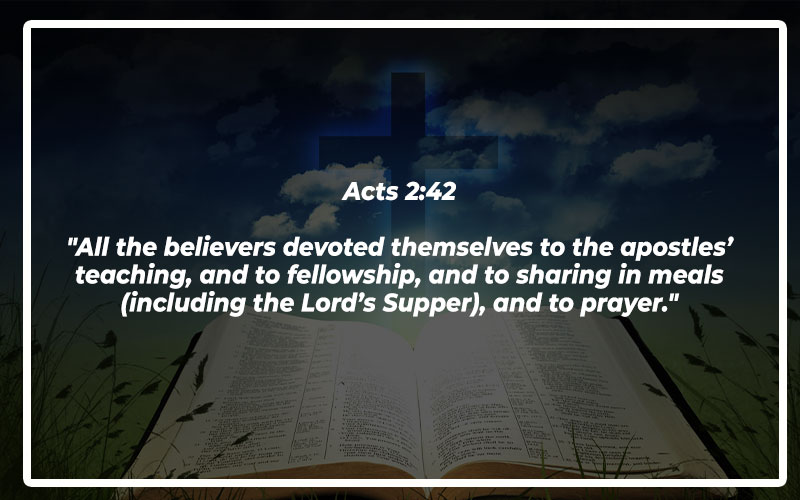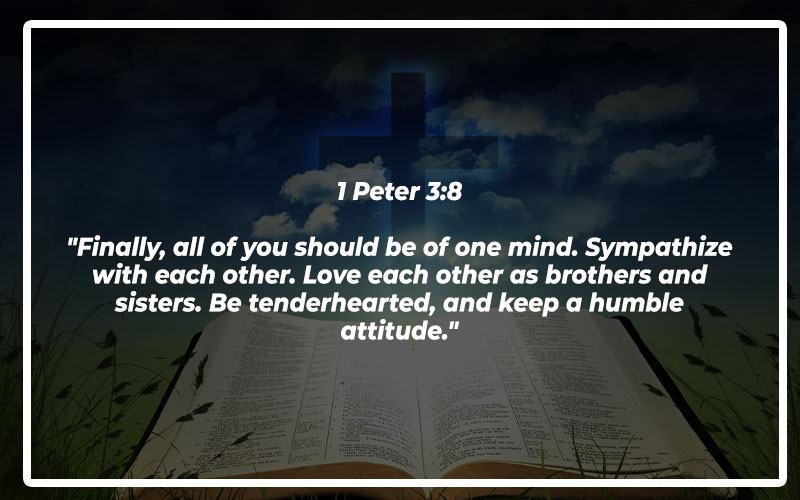Fellowship is a vital part of the Christian life. It means coming together, sharing our lives, supporting each other, and growing in our faith as a community.
In the Bible, fellowship is emphasized as a way for believers to encourage one another, strengthen their faith, and fulfill God’s purpose together.
The Bible verses below highlight the importance of fellowship and how it shapes our journey as followers of Christ. Do read on!
Also Read: Bible Verses About Putting Others First
Top Bible Verses About Fellowship
Acts 2:42
“All the believers devoted themselves to the apostles’ teaching, and to fellowship, and to sharing in meals (including the Lord’s Supper), and to prayer.”
This verse highlights the early Christian community’s commitment to four key practices: teaching, fellowship, communal meals, and prayer. Fellowship here signifies a deep, communal bond among believers, emphasizing the importance of togetherness and mutual support in spiritual growth and practice.
Hebrews 10:24-25
“Let us think of ways to motivate one another to acts of love and good works. And let us not neglect our meeting together, as some people do, but encourage one another, especially now that the day of his return is drawing near.”
These verses stress the importance of regular gatherings and mutual encouragement among believers. Fellowship is portrayed as a source of motivation and support, crucial for maintaining love, good works, and faithfulness, especially as the anticipation of Christ’s return grows.
1 John 1:7
“But if we are living in the light, as God is in the light, then we have fellowship with each other, and the blood of Jesus, his Son, cleanses us from all sin.”
Living in the light of God fosters genuine fellowship among believers. This verse connects fellowship with the transformative power of Jesus’ sacrifice, suggesting that true fellowship is both a reflection and a result of a shared life in Christ.
Romans 12:4-5
“Just as our bodies have many parts and each part has a special function, so it is with Christ’s body. We are many parts of one body, and we all belong to each other.”
Paul uses the metaphor of the human body to describe the church, emphasizing interdependence and unity. Fellowship here means recognizing and valuing each member’s unique role, fostering a sense of belonging and mutual responsibility within the body of Christ.
1 Corinthians 12:12-14
“The human body has many parts, but the many parts make up one whole body. So it is with the body of Christ. Some of us are Jews, some are Gentiles, some are slaves, and some are free. But we have all been baptized into one body by one Spirit, and we all share the same Spirit.”
These verses underscore the diversity and unity of the church. Fellowship is not hindered by differences but is enhanced by the Spirit that unites all believers, making them one body in Christ. This unity in diversity is a key aspect of Christian fellowship.
Philippians 2:1-2
“Is there any encouragement from belonging to Christ? Any comfort from his love? Any fellowship together in the Spirit? Are your hearts tender and compassionate? Then make me truly happy by agreeing wholeheartedly with each other, loving one another, and working together with one mind and purpose.”
Paul appeals for unity and mutual love among believers, grounded in their shared experience of Christ’s love and the Spirit’s fellowship. This unity, love, and collaborative purpose are vital expressions of true Christian fellowship.
1 Thessalonians 5:11
“So encourage each other and build each other up, just as you are already doing.”
Paul emphasizes the role of encouragement and edification in fellowship. Building each other up is essential for spiritual growth and communal strength, reflecting a supportive and uplifting fellowship among believers.
Colossians 3:16
“Let the message about Christ, in all its richness, fill your lives. Teach and counsel each other with all the wisdom he gives. Sing psalms and hymns and spiritual songs to God with thankful hearts.”
Fellowship involves teaching, counseling, and worshiping together. This verse portrays a rich communal life where the message of Christ is central, and mutual edification and worship are key aspects of fellowship.
Matthew 18:20
“For where two or three gather together as my followers, I am there among them.”
Jesus assures His presence in the midst of even small gatherings of believers. This promise highlights the significance of fellowship, where communal worship and prayer invite the presence of Christ, strengthening the bond among believers.
1 Peter 4:9-10
“Cheerfully share your home with those who need a meal or a place to stay. God has given each of you a gift from his great variety of spiritual gifts. Use them well to serve one another.”
Hospitality and service are key components of fellowship. Peter encourages believers to use their gifts to serve each other, reflecting a fellowship characterized by generosity, hospitality, and the effective use of spiritual gifts for communal benefit.
Galatians 6:2
“Share each other’s burdens, and in this way obey the law of Christ.”
Fellowship involves sharing burdens and supporting each other through difficult times. This mutual support is an expression of obedience to Christ’s command to love one another, reinforcing the importance of compassionate and caring fellowship.
1 Corinthians 1:9
“God will do this, for he is faithful to do what he says, and he has invited you into partnership with his Son, Jesus Christ our Lord.”
Believers are called into fellowship with Jesus Christ, highlighting the divine initiative in establishing this relationship. This partnership with Christ is foundational to Christian fellowship, uniting believers in a shared relationship with the Lord.
1 Corinthians 12:25-27
“This makes for harmony among the members, so that all the members care for each other. If one part suffers, all the parts suffer with it, and if one part is honored, all the parts are glad. All of you together are Christ’s body, and each of you is a part of it.”
These verses emphasize the interconnectedness and mutual care within the body of Christ. Fellowship means sharing in each other’s joys and sufferings, fostering a deep sense of unity and empathy among believers.
2 Corinthians 13:11
“Dear brothers and sisters, I close my letter with these last words: Be joyful. Grow to maturity. Encourage each other. Live in harmony and peace. Then the God of love and peace will be with you.”
Paul’s exhortation highlights key aspects of fellowship: joy, maturity, encouragement, harmony, and peace. These qualities foster a healthy and vibrant community, reflecting the presence of the God of love and peace among believers.
1 Thessalonians 4:18
“So encourage each other with these words.”
This brief exhortation underscores the role of encouragement in fellowship. Believers are to uplift each other with comforting and hopeful words, particularly in light of the promise of Christ’s return, strengthening their communal bonds.
Also Read: Bible Verses About Brotherly Love
Ephesians 4:2-3
“Always be humble and gentle. Be patient with each other, making allowance for each other’s faults because of your love. Make every effort to keep yourselves united in the Spirit, binding yourselves together with peace.”
Paul calls for humility, gentleness, patience, and love in maintaining unity. These virtues are essential for peaceful and harmonious fellowship, reflecting the Spirit’s work in binding believers together.
Romans 15:5-6
“May God, who gives this patience and encouragement, help you live in complete harmony with each other, as is fitting for followers of Christ Jesus. Then all of you can join together with one voice, giving praise and glory to God, the Father of our Lord Jesus Christ.”
Paul prays for harmony and unified worship among believers. Fellowship here is portrayed as a harmonious relationship that glorifies God, with believers united in purpose and voice in their praise.
Philippians 1:3-5
“Every time I think of you, I give thanks to my God. Whenever I pray, I make my requests for all of you with joy, for you have been my partners in spreading the Good News about Christ from the time you first heard it until now.”
Paul expresses gratitude and joy for the Philippians’ partnership in the gospel. This fellowship is marked by shared mission and mutual support, highlighting the collaborative and joyful nature of Christian fellowship in spreading the gospel.
Acts 4:32
“All the believers were united in heart and mind. And they felt that what they owned was not their own, so they shared everything they had.”
The early Christians’ unity and generosity are emphasized here. Fellowship involved sharing possessions and resources, reflecting a profound sense of communal ownership and mutual care among believers.
Galatians 2:9
“In fact, James, Peter, and John, who were known as pillars of the church, recognized the gift God had given me, and they accepted Barnabas and me as their co-workers. They encouraged us to keep preaching to the Gentiles, while they continued their work with the Jews.”
This verse highlights the recognition and support among church leaders. Fellowship among leaders is essential for the mission of the church, fostering collaboration and mutual encouragement in their distinct but complementary ministries.
Ephesians 4:15-16
“Instead, we will speak the truth in love, growing in every way more and more like Christ, who is the head of his body, the church. He makes the whole body fit together perfectly. As each part does its own special work, it helps the other parts grow, so that the whole body is healthy and growing and full of love.”
Speaking the truth in love and mutual growth are key aspects of fellowship. Each member’s contribution helps the entire body grow, promoting a healthy and loving community that reflects Christ, the head of the church.
James 5:16
“Confess your sins to each other and pray for each other so that you may be healed. The earnest prayer of a righteous person has great power and produces wonderful results.”
James emphasizes confession and prayer as integral to fellowship. These practices foster transparency, accountability, and mutual support, contributing to spiritual and physical healing within the community.
1 Corinthians 14:26
“Well, my brothers and sisters, let’s summarize. When you meet together, one will sing, another will teach, another will tell some special revelation God has given, one will speak in tongues, and another will interpret what is said. But everything that is done must strengthen all of you.”
Paul describes a participatory and edifying fellowship. Each member’s contribution is meant to strengthen the community, highlighting the importance of diverse gifts and active participation in building up the body of Christ.
2 Timothy 2:22
“Run from anything that stimulates youthful lusts. Instead, pursue righteous living, faithfulness, love, and peace. Enjoy the companionship of those who call on the Lord with pure hearts.”
Paul advises Timothy to seek righteous living and enjoy fellowship with other believers. This companionship with like-minded individuals fosters spiritual growth and supports a life of faithfulness, love, and peace.
1 John 1:3
“We proclaim to you what we ourselves have actually seen and heard so that you may have fellowship with us. And our fellowship is with the Father and with his Son, Jesus Christ.”
John emphasizes that the proclamation of the gospel aims to bring others into fellowship with believers and with God. This verse underscores the vertical and horizontal dimensions of Christian fellowship, rooted in shared faith and relationship with God.
Ecclesiastes 4:9-10
“Two people are better off than one, for they can help each other succeed. If one person falls, the other can reach out and help. But someone who falls alone is in real trouble.”
Solomon highlights the practical benefits of companionship and mutual support. Fellowship provides a safety net, ensuring that when one person falters, others are there to offer assistance, reflecting the value of community and mutual aid.
1 Corinthians 12:20-21
“Yes, there are many parts, but only one body. The eye can never say to the hand, ‘I don’t need you.’ The head can’t say to the feet, ‘I don’t need you.'”
Paul stresses the interdependence of believers within the body of Christ. No member is self-sufficient; each one needs the others. This interdependence is a fundamental aspect of fellowship, promoting unity and mutual reliance.
2 Corinthians 8:4
“They begged us again and again for the privilege of sharing in the gift for the believers in Jerusalem.”
The Macedonian Christians eagerly desired to contribute to the needs of the Jerusalem church. Their generosity and eagerness to share reflect a deep sense of fellowship and solidarity among believers, even across geographical boundaries.
1 Peter 3:8
“Finally, all of you should be of one mind. Sympathize with each other. Love each other as brothers and sisters. Be tenderhearted, and keep a humble attitude.”
Peter calls for unity, sympathy, love, tenderness, and humility among believers. These virtues foster a compassionate and supportive fellowship, reflecting the familial bond that characterizes the Christian community.
Romans 12:10
“Love each other with genuine affection, and take delight in honoring each other.”
Paul encourages genuine love and mutual honor among believers. This affectionate and respectful fellowship strengthens relationships and builds a loving community where each person is valued and honored.
Galatians 6:10
“Therefore, whenever we have the opportunity, we should do good to everyone—especially to those in the family of faith.”
Paul urges believers to do good to all, with a special emphasis on fellow Christians. This call to benevolence underscores the priority of caring for and supporting those within the faith community, enhancing the bonds of fellowship.
Ephesians 2:19
“So now you Gentiles are no longer strangers and foreigners. You are citizens along with all of God’s holy people. You are members of God’s family.”
Paul declares that Gentile believers are fully integrated into the family of God. This inclusion signifies a fellowship that transcends ethnic and cultural boundaries, creating a diverse but united family of believers.
Acts 20:35
“And I have been a constant example of how you can help those in need by working hard. You should remember the words of the Lord Jesus: ‘It is more blessed to give than to receive.’”
Paul emphasizes the blessing of giving, encouraging believers to support those in need. This generosity is a vital aspect of fellowship, reflecting the selfless love and service that characterize the Christian community.
Hebrews 13:16
“And don’t forget to do good and to share with those in need. These are the sacrifices that please God.”
The author of Hebrews reminds believers to do good and share with others, highlighting these actions as pleasing sacrifices to God. Such acts of kindness and sharing are essential components of fellowship, demonstrating practical love and care within the community.
Also Read: Bible Verses About Sisterly Love
What Does the Bible Say About Fellowship
Fellowship is a vital concept in the Bible, reflecting the communal and relational nature of the Christian faith. The Greek word for fellowship, “koinonia,” encompasses a range of meanings including partnership, sharing, and communion. It signifies a deep, spiritual connection among believers, founded on their shared faith in Jesus Christ and their mutual commitment to live out the gospel together.
The early church provides a vivid example of fellowship in action. Acts 2:42 describes how the believers “devoted themselves to the apostles’ teaching, and to fellowship, and to sharing in meals (including the Lord’s Supper), and to prayer.” This verse highlights four key practices: learning, communal living, breaking bread, and prayer. Their fellowship was characterized by a deep sense of community and mutual support, where they shared their possessions and cared for each other’s needs (Acts 2:44-45).
Fellowship is not just about social interaction; it is a spiritual discipline that fosters growth and unity within the body of Christ. Hebrews 10:24-25 exhorts believers to “think of ways to motivate one another to acts of love and good works” and to “not neglect our meeting together, as some people do, but encourage one another.” Regular gatherings are essential for encouragement, accountability, and spiritual edification.
Furthermore, fellowship is a reflection of the unity believers have in Christ. 1 Corinthians 12:12-14 emphasizes that, though believers are diverse, they are one body in Christ. This unity is also a testimony to the world, as Jesus prayed in John 17:21, “I pray that they will all be one, just as you and I are one.”
True fellowship also involves bearing one another’s burdens (Galatians 6:2), practicing hospitality (1 Peter 4:9), and using one’s gifts to serve others (1 Corinthians 12:7).



